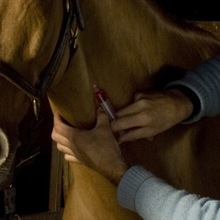We humans think nothing of having our blood drawn once a year to have a “screen” of tests run in order to give us an accurate account of where some of our important baseline “numbers” stand.

Blood tests for horses, too
With advances in equine laboratory testing, you now can have—and should have--a general health profile chemistry panel and a complete blood count (CBC) run on your horses annually.
In fact, we often look forward with anticipation (or maybe dread) to knowing what our cholesterol, triglycerides, blood sugar, or other levels are at that time, and seeing how they have changed for better or worse since our last tests.
Did you know the same type of testing is available for your horse?
With advances in equine laboratory testing, you now can have—and should have--a general health profile chemistry panel and a complete blood count (CBC) run on your horses annually. These are the equine versions of what you get with your annual checkup and blood test.
Best of all, the equine blood tests can be done with that one blood sample your equine veterinarian draws for your annual Coggins test.
All equine veterinarians have access to the blood analysis systems used for this equine general health profile. Some veterinarians own the equipment needed to analyze these blood parameters right in their clinic or hospital. Other veterinarians use local or national laboratories to have blood chemistry profiles run on their patients. Either way, the results are back quickly.
Whether your horse is a backyard buddy or a high-level competitive athlete, there is value in knowing what his baseline numbers are in order to catch any abnormalities early, to monitor levels that are outside normal boundaries, and to protect your horse and the horses he comes in contact with (which is why you have a Coggins test run each year to detect the presence of equine infectious anemia, or EIA).
Ask your veterinarian about expanding the knowledge of your horse’s baseline health with the use of equine blood tests.
Article provided By Kimberly S. Brown, THINInc.com
